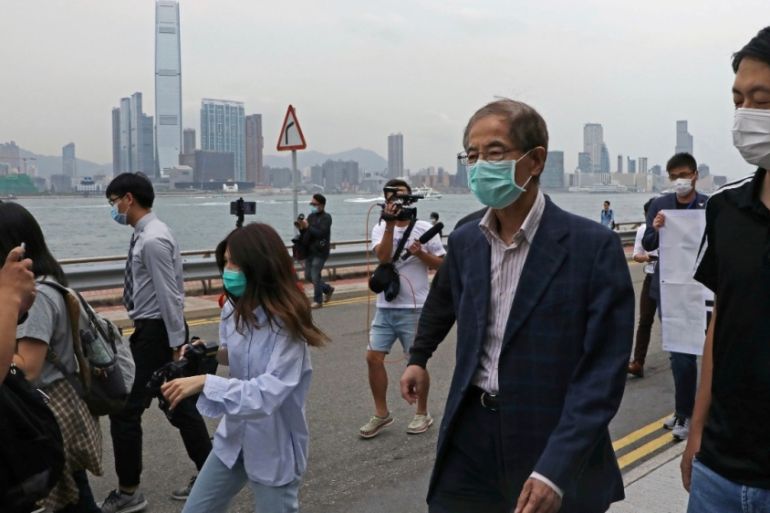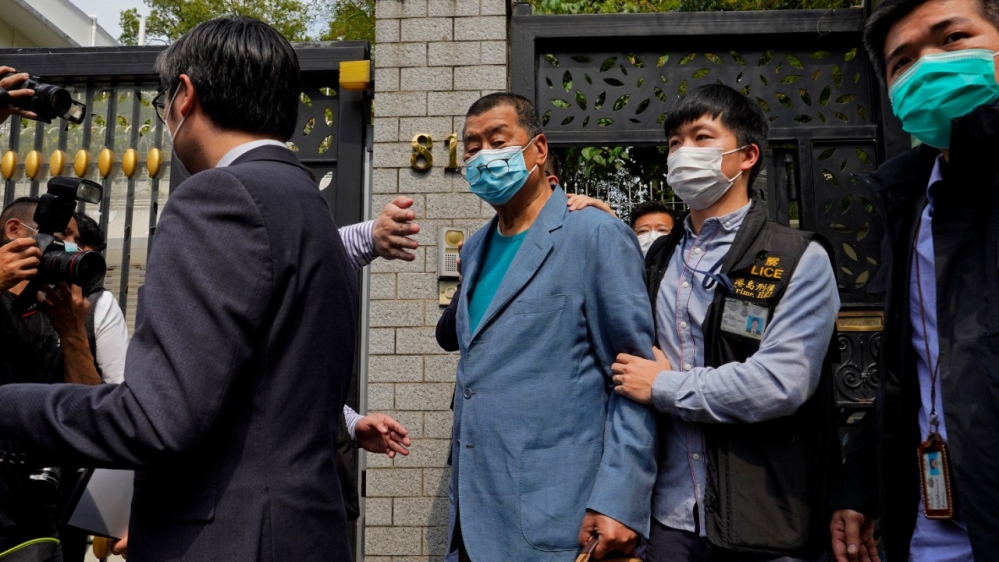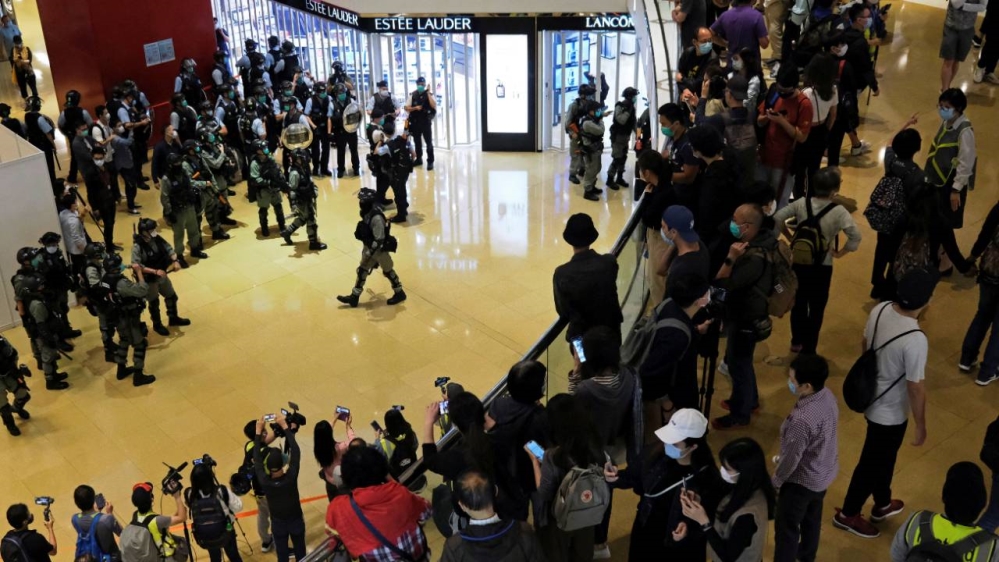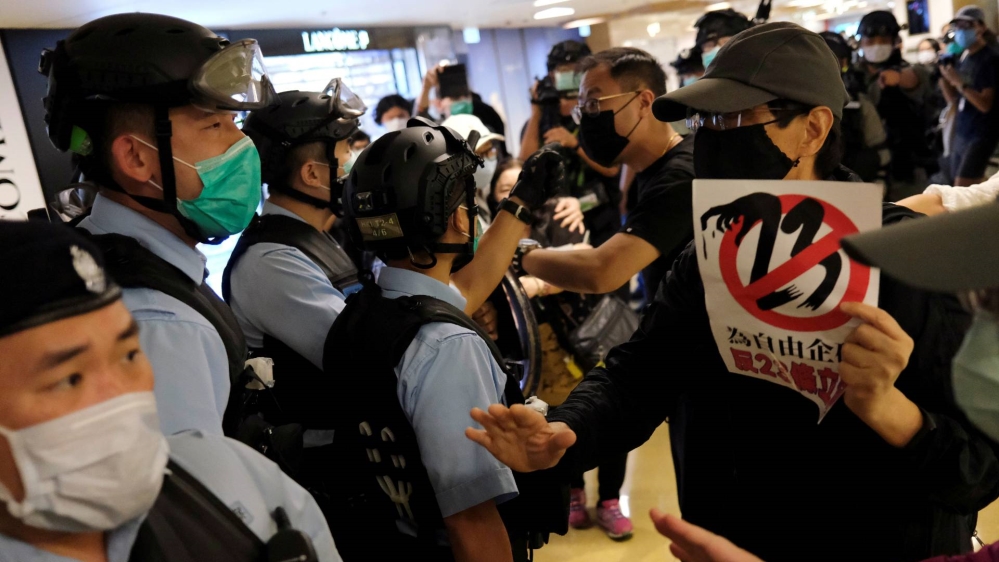Crackdown against Hong Kong activists sparks protest talk
Arrests of pro-democracy activists, warnings from China shake up Hong Kong as the coronavirus keeps protesters at home.

Hong Kong – Mass arrests in recent days have reignited talks of large protests returning in Hong Kong, as police targeted prominent pro-democracy figures involved in last year’s protest movement.
Over the weekend, demonstrators defied government-mandated distancing measures, protesting inside a mall in what is likely to become a trend in the lead-up to the city’s Legislative Council (Legco) elections in September.
Keep reading
list of 3 itemsHong Kong activists arrested over last year’s mass protests
Anti-government sentiment persists in Hong Kong
On April 18, 15 prominent pro-democracy figures were arrested for participating in protests last year, including 71-year-old media magnate Jimmy Lai and the city’s “Father of Democracy” and founding member of the Democratic Party, Martin Lee, 81.
Following Lai’s arrest, Lee said he “could sense” police would be after him, too.
After a Saturday morning trip to the Peak for exercise and breakfast with his wife at Hong Kong island’s highest hill, Lee he was left “thinking what to do for the rest of the day.”
“The police provided me with the answer – they told me what to do,” he told Al Jazeera, describing the moment seven officers arrived at his door with a search warrant.
|
|
At a time when governments around the world have started to release some prisoners and detainees for humanitarian reasons due to the coronavirus outbreak, police arrested Lee on two offences: organising an unauthorised assembly on August 18 last year, and participating in the same event.
“I think a lot of people will be very disillusioned when they arrest even mild protesters like us, who have never used any force,” he said.
Coronavirus damaging China’s reputation
While COVID-19, the disease caused by the coronavirus, has kept demonstrators at home, protest sentiment in Hong Kong has remained visible in the form of support for pro-democracy businesses and social media activism.
But in the days following the arrests, anger has spilled back onto the streets.
Anthony Dapiran, author of City on Fire: The Fight for Hong Kong, said that, while he is unconvinced the virus has been used as a “cover” for a legal crackdown in Hong Kong as some have suggested, he believes a crackdown was always inevitable.

He added that the outbreak has also influenced Beijing’s approach in the lead-up to the Legco elections.
Dapiran noted that, in the past, China had tried to use its soft power “to try and increase” its influence on Hong Kong’s residents “in a positive way”, but has since taken a tougher stance.
“But the virus has really done damage to the mainland’s reputation in Hong Kong. Many Hong Kongers blame the mainland authorities, not so much for the virus, but what many see as the cover-up that enabled the virus to spread,” the longtime Hong Kong resident said.
Tactic of repression
With the pandemic and the protests, building goodwill has become unachievable for Beijing, according to Dapiran.
“So all they’re left with as a tactic is repression,” he said.
In addition to the arrests, Hong Kong’s pro-democracy camp is grappling with recent comments from the Hong Kong and Macau Affairs Office (HKMAO) – China’s main body that oversees the affairs of the two cities.
HKMAO recently expressed its support for the Hong Kong police and singled out pro-democracy Civic Party legislator Dennis Kwok for criticism, accusing him of abusing his role as Legco member through filibustering.
|
|
The Hong Kong government of Carrie Lam has expressed its support of HKMAO’s comments.
But Lee, the pro-democracy icon, questioned the HKMAO’s latest move.
“They say that Article 22 does not apply to them, because they are not departments of the Central Government,” he said, referring to an article in Hong Kong’s de facto constitution or Basic Law that precludes interference by China’s government in affairs Hong Kong administers.
“Then my question is, ‘What are you? Are you a department of the German government?’ Absolutely not. They are certainly not a department of the Hong Kong government, so they must be a department of the Chinese central government.”
‘Muscle-showing exercise’
The recent arrests in Hong Kong also come at a time when its media has sunk seven places in the World Press Freedom Index.
Cedric Alviani, head of Reporters Without Borders’s East Asia bureau, told Al Jazeera that the highly public arrest of Lai was an attempt to damage the reputation of the entrepreneur and publisher of Apple Daily, Hong Kong’s second best-selling newspaper.
|
|
Meanwhile, Alvin Yeung, Legco member and leader of the Civic Party, said the arrests and the recent HKMAO statements are clearly “a muscle-showing exercise” by Beijing.
“That really opens up a floodgate, in a sense, that they don’t mind to be seen as interfering,” he told Al Jazeera, as he expressed concern over the possible disqualification of his colleague, Kwok.
“My colleague Dennis Kwok is like the top enemy of the state. Could you imagine someone like Dennis Kwok could become that? Then anything could happen. All we can do is stick to whatever we think is right,” says Yeung.
‘Winter is here’
Yeung said it is becoming more challenging for pro-democracy leaders to stand up to China, as the Hong Kong government only listens to Beijing loyalists.
“It’s probably going to be a long winter, but when winter is here, you know spring is just around the corner. Maybe a far end corner, but eventually,” Yeung said, comparing the situation in Hong Kong to the US fantasy drama, Game of Thrones, about a fight for political supremacy and struggle for freedom.
Yeung said he expects more protests in the coming weeks and months as regulations ease on physical distancing measures put in place to help curb the spread of the coronavirus.

“We don’t have a choice but to stand and fight. When the other side isn’t going to back down, our choices are limited.”
At present, Hong Kong continues to ban groups of more than four people.
“Police have zero tolerance against any violation and will take strict enforcement action,” a police statement responding to calls for protest said.
Lee, the pro-democracy leader, has long advocated for non-violent measures, but he concedes that there have been times when a “mild degree of force” has gained results.

He cited the June 19 protest, when young Hong Kong activists prevented pro-Beijing legislators from entering the Legco building and passing the widely-criticised China extradition bill. After several adjournments, the bill was eventually withdrawn.
“It would have become law, and the older people, including me, could be sent back to China for trial, on trumped-up charges,” he told Al Jazeera.
But Lee believes that most of the students would not want to continue using force if China were to respect the rights of Hong Kong citizens.
As for Dapiran, the Hong Kong-based lawyer and author, he said protesters have to find a balance between wanting to put pressure on the government and expressing various grievances.
He said the pro-democracy figures, activists and students would not want to give the government “an excuse to call off” the September 2020 elections.